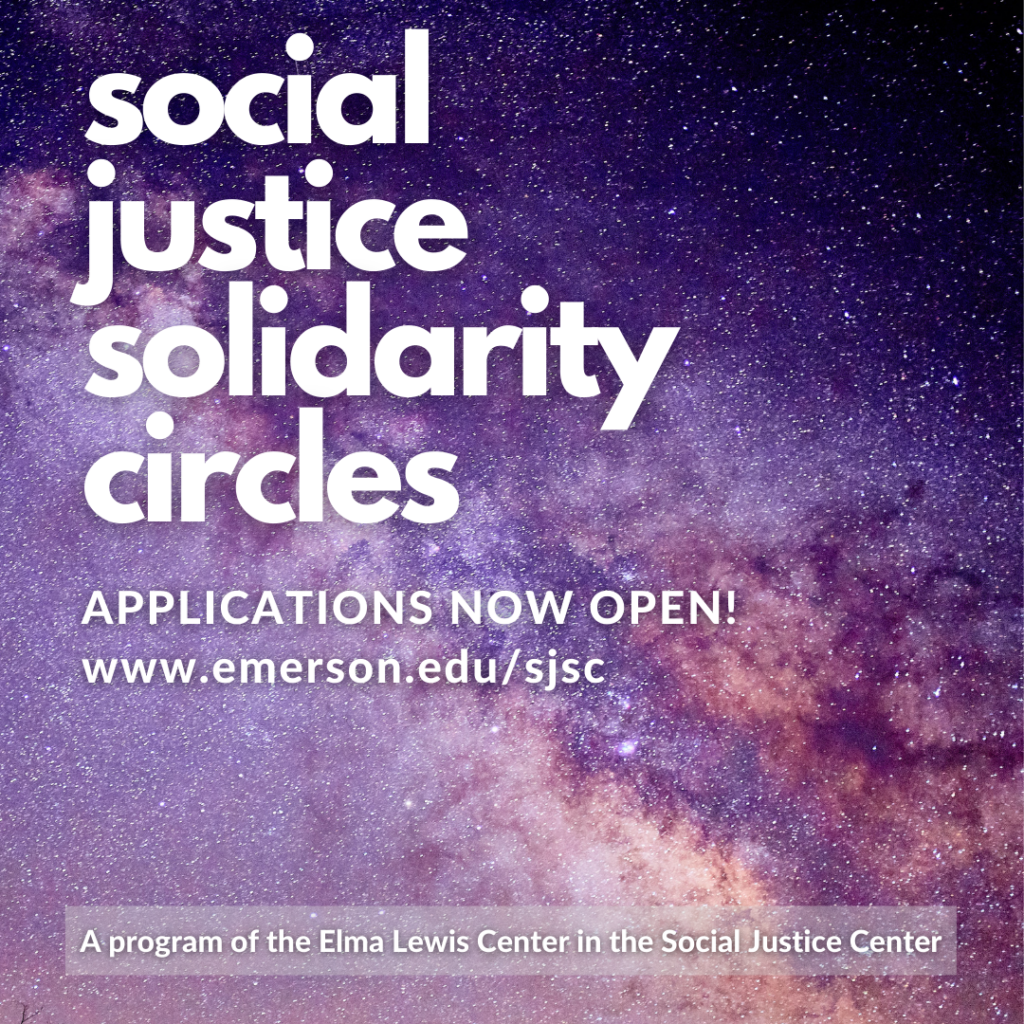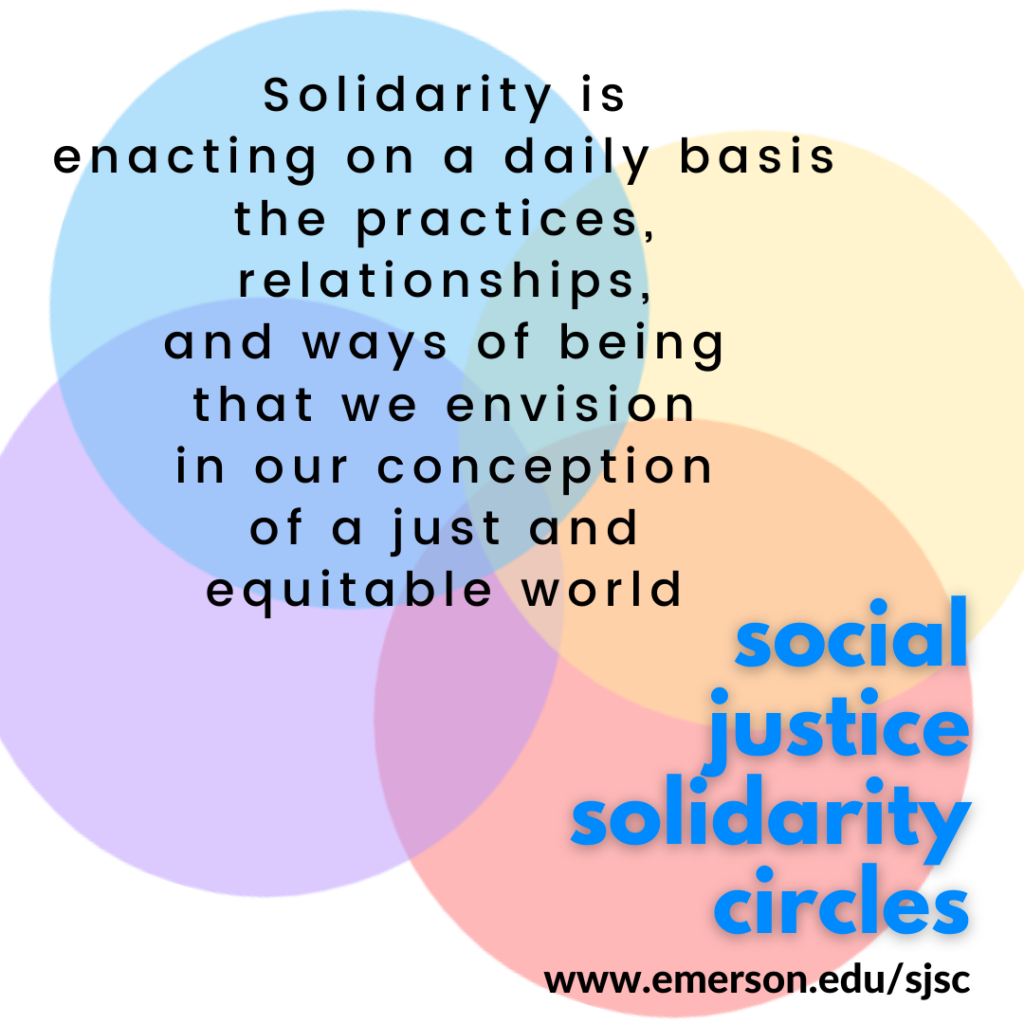New Elma Lewis Center Program Looks to Build Lifelong Commitment to Social Justice
The Elma Lewis Center’s new Social Justice Solidarity Circles program offers an opportunity to build a practice of solidarity as a lifelong commitment, not a single act or destination.
The 11-month program was shaped by the coordinator’s inspiration to create and direct an alternative to alternative spring break programs (ASB), which they participated in and ran at Emerson for more than a decade. In ASB programs, students dedicate their spring break to community engagement work. For several years, Emerson students worked with community organizations in El Paso, Texas, to learn about migration, immigration enforcement, and what it’s like for undocumented people to live on the Mexican-American border.

While spring break programs can be very meaningful, most students only participate once or twice and don’t have the opportunity to immerse themselves in the organizations’ work. The Social Justice Solidarity Circles program grows from a social justice framework that addresses the challenges that come with a short-term service-oriented program like ASB.
“Social transformation grows out of deep, equitable relationships and ways of being that are not possible to build in a week’s time,” said Ashley Tarbet DeStefano ’09, assistant director for community engagement with the Elma Lewis Center. “It requires an ongoing commitment to dreaming and shaping new social relations and institutions that are more just, joyous, and beautiful.”
The new program is accepting a cohort of eight students for its inaugural year. Applications are available online and must be submitted no later than 5:00 pm on October 20. Each student will receive a $1,000 stipend paid in two installments.
“This work is very valuable, especially given that doing justice to the work invites us to bring to the table all of who we are,” said Elma Lewis Center Executive Director Tamera Marko. “This means intellectual, spiritual, and emotional labor, as well as hands-on experiences, questions, creative innovations, relationships, and expertise. It also means emotional and embodied wisdom. Labor, and especially emotional labor, is [made invisible] and devalued in many societies, a practice that disproportionately harms people, including women of color, immigrants, disabled, and queer and trans folks. By providing a stipend for this program’s social justice practice we recognize the hard work students do to impact themselves and the world around them, through authentic relationships and community care.”

That work involves students engaging weekly with a community-based organization to build a relationship and contribute meaningfully to their work.
“This program is structured in a way that is meant to center community leaders most directly impacted by systems of injustice and to support their self-defined goals while engaging in generative conversations with the members of the Solidarity Circles,” said Marko.
Students will work with their community organizations during inter-session and outside of the normal academic calendar, which both Marko and DeStefano stressed. DeStefano said a top concern of community organizations is the strain on capacity required of training and relationship-building with student volunteers who turn over every semester and often leave the city during summer break. The needs and work of a community continue past the end of the academic year.
“We really want students to make relationships with these organizations, and I hope they’ll continue the work and relationship after the program,” said DeStefano. “They’re learning about the community they’re working in, the larger systemic injustices that those organizations are fighting, and the visionary possibilities of abolitionist futures. What does liberation look like and what works needs to be done to move us in that direction?”
Students are welcome to suggest organizations they propose to work with, and the Elma Lewis Center has established collaborations with local organizations such as the Building Up People Not Prisons Coalition, and the Boston Immigration Justice Accompaniment Network.
As part of the program, the cohort will meet weekly (this year virtually) to discuss, learn, and reflect on solidarity and social justice. Students will work with DeStefano to craft part of their program curriculum by choosing their own social justice issues and corresponding texts to explore.
Applicants do not need to have experience with social justice work or community organizing to be accepted into the program. They should be able to exhibit a commitment to self-improvement. Applicants need to show an awareness of building community relationships, and that could be involvement in a house of worship, community projects, community service organizations, or simply something like taking care of an immunocompromised neighbor during quarantine.
The cohort will host monthly virtual action circles to support and amplify the needs of the community collaborators. Action circles are a long-standing practice in social justice circles and movements because social justice can’t be achieved in isolation, said DeStefano.
DeStefano said a recent Elma Lewis Center action circle involved learning about abolition and the immigration system, and then using an action guide to take specific actions. That included the opportunity to call a local sheriff’s office to urge him to end the county’s agreement to hold U.S. Immigration and Customs Enforcement (ICE) detainees. Students did this while muted on Zoom together.
As this is the pilot year for the program, determining success is integral.
“Do [all involved] feel they were in meaningful relationships? Did they accomplish something meaningful?” asked Marko. “The emphasis of meaningfulness might be different for a student. For them, it might be meaningful that this whole universe opened up for them and could change the course of one person’s life. For the organization they may want to get something this or that done.”
Categories